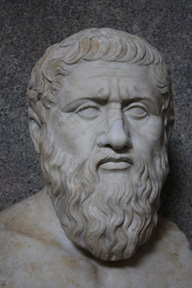Treating shadows as real objects
 Using our senses we think that we see real things such birds, ships
and houses. If somebody says that we do not see real birds, ships and
houses, they will be treated as insane. However, Plato did just that but
nobody called him an insane person. He said we live in an illusory world
of the senses which contain imperfect copies of the Ideal Forms. To
drive home his point, Plato said, “We are born with the concepts of
these Ideal Forms in our minds.” Using our senses we think that we see real things such birds, ships
and houses. If somebody says that we do not see real birds, ships and
houses, they will be treated as insane. However, Plato did just that but
nobody called him an insane person. He said we live in an illusory world
of the senses which contain imperfect copies of the Ideal Forms. To
drive home his point, Plato said, “We are born with the concepts of
these Ideal Forms in our minds.”
Because of this conditioning we recognise various things in the
world. We know what a tree, dog or door is. Sometimes we may not know
that they are imperfect copies of the concepts in our mind. It will take
a long time for us to understand that everything in this world is a
shadow of its Ideal Form in the World of Ideas.
Although Plato was a great philosopher, very little is known about
his life. He was born into a noble family in Athens in about 427 BCE. He
was named Aristocles but he soon acquired the nickname “Plato” meaning
“broad.” At the beginning he was involved in the country’s politics, but
he soon became a pupil of Socrates.
The Academy
When Socrates was condemned to death for misleading the youth in
Athens, Plato became disillusioned with his life in the city. After
leaving Athens he travelled widely, spending some time in Italy and
Sicily. However, he returned to Athens in 385 BCE and founded his school
of philosophy popularly knowns as the Academy. He headed the school
until his death in 347 BCE.
If not for Plato much of what Socrates taught would have perished
after his death. Plato took upon himself the Honerous task of recording
his master’s views on philosophy. In the Apology Plato retells how
Socrates defended himself at his trial. Later Plato used Socrates as a
character in his Dialogues. One major problem with the Dialogues is that
we find it difficult to differentiate between Socrates’s and Plato’s
ideas.
|

Everything in this world is a “shadow” of its Ideal Form in
the World of Ideas.
- Plato (c.427-347 BCE) |
Although Plato did not agree with Socrates on certain concepts, he
used his master’s technique of exploring and explaining his original
ideas. In the Republic, Plato set out his vision of the ideal city State
and also explored certain aspects of virtue. Sometimes he questioned the
nature of the cosmos and explored how the immutable and eternal could
exist in a changing world.
Virtue
Socrates said, “Virtue is knowledge” and to act justly we must ask
what justice means. Plato, on the other hand, said that we should first
recognise the correct form of doing anything. Such a form should be true
for all societies and all time. What he meant was that some kind of
ideal form of things should exist. It is here that he comes up with his
World of Ideas or World of Forms.
Plato said that human senses cannot perceive the World of Ideas. The
world around us is modelled on it. To illustrate his point, Plato
presented his well-known “Allegory of the Cave.” He wanted people to
imagine a cave in which people have been imprisoned from birth. They
remain tied facing the back wall in the darkness. There is a bright fire
behind them casting shadows on the wall.
When people see only the shadow of things for a long time, they
conclude that they see the real objects. Even if they are let loose and
allowed to see real objects, they will go back to the cave to see the
shadows. Therefore, Plato concludes that the material world we live in
is like the images in the cave wall. As a result, we will never see real
objects which are found only in the World of Ideas.
Plato had a tremendous influence on his best pupil Aristotle.
However, Aristotle did not agree with his mentor’s World of Ideas.
Plato’s philosophy had an impact on Islamic and Christian thinkers. In
fact, St. Augustine combined Plato’s ideas with those of the Church.
Plato is also credited with laying the foundation for Rationalism
which flourished in the 17th century. Plato is a force to reckon with
because his ideas still pervade the firmament of Western philosophy.
|

